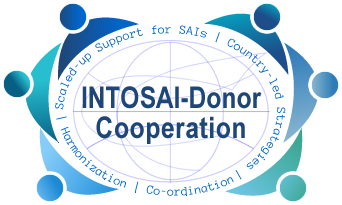How technology needs arising from the pandemic have helped the INTOSAI-Donor Cooperation walk the talk in bringing donors, partners and Supreme Audit Institutions together to upscale SAI support.
The INTOSAI-Donor Cooperation (IDC), INTOSAI’s collaborative platform that brings Supreme Audit Institutions (SAIs) in developing countries together with local, regional and global providers of practical, technical resources and donor support, was created in 2009. As a strategic partnership between SAIs and donors, IDC has always focused on encouraging SAIs to lead their development themselves, while facilitating the opportunities that will help SAIs survive and make positive impact in the national PFM systems.
Then, of course, came 2020 and the unwanted but unavoidable arrival of a global pandemic. Along with the rest of the world, IDC had to reconfigure its plans and work out how to support the most vulnerable SAIs quickly and effectively. At a worldwide level, and in close partnership with IDI and with IDC members who provide emergency funding – notably the World Bank and the International Monetary Fund – IDC worked rapidly to raise awareness of the crucial role SAIs would play in the oversight and overall integrity systems around COVID-19 emergency spending.
For some countries, upholding existing support nationally meant continuing the implementation of existing programmes like the PAP-APP bilateral support initiative. For others – perhaps all SAIs, in fact – it required innovative solutions to the challenges of shifting to online digital systems for audits, meetings, receiving funding into secure bank accounts and more.
Grant programs successful in supporting SAIs during the pandemic
Two innovative grant programs provided direct and immediate response to the need for SAIs to ‘keep the lights on’ during COVID-19. INTOSAI’s PFAC grant offered immediate support for tools related to IT and health and safety, while the Saudi Fund for Improved SAI performance (SAUDI FISP) disbursed funding for INTOSAI members to develop and expand their ICT infrastructure.
The grants could be used for a range of practical measures, from buying laptops so staff could work from home to improving server connectivity and security. The PFAC provision of up to 700,000 Euros supported 52 SAIs across seven regions with direct grants delivered within 14 months. FISP, now in its third round, has provided 59 SAIs with grants from as little as $30,000 USD to $100,00 USD to improve their technology equipment and networks.
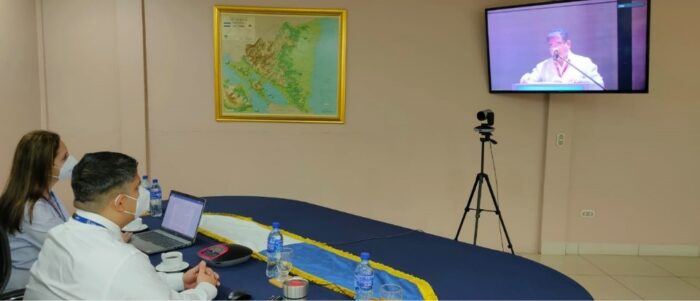
SAI Nicaragua use their PFAC grant to ‘keep the lights on’
Thanks to INTOSAI for promoting these initiatives to support SAIs that have had technological and budgetary limitations to continue their work during the pandemic.
Dr. María José Mejía García, Head of SAI Nicaragua
Making things more clear and concise
What also came out of this particular funding, however, was some interesting feedback for IDC. As the funding in both cases was for urgent and immediately identifiable needs, IDI’s Global Foundations Unit (GFU) arranged for it to be delivered via a quick and simple process. SAIs received information about the grant possibility in their own language. They knew how much they could apply for, and the specific challenges for which the grant could be used. They knew the deadline. There was a simple form to fill in, support in drafting the application and, for PFAC especially, a speedy process to receive the funds so they could be used rapidly. The general response to the funding process was that SAIs appreciated not just the grants themselves, but also the robust yet straightforward procedure for obtaining the grant.
The PFAC and FISP strategy of targeting improvements in information technology impacted on several aspects of IDC’s approach. For example, SAIs and IDC members had been supplying data to the SAI Capacity Development Database over some years, for a global overview of capacity development projects and a fast method for identifying support trends and results. This, however, needed more focus, along with the need to use digital innovation to support SAIs. In a newly created role, Database Manager Laurent Soublin now provides a guiding hand in updating the Database, as well as collaborating with partners and SAIs on the IDC Working Group on Technology.
Early success of the BUSS
Of course, IDC has always aimed for its services to SAIs to be clear and accessible, but this feedback added a new dimension. It is a question which the partners and donors, the Steering Committee and GFU have held uppermost in their minds throughout the last two years: how can the Cooperation give the same high level of support through refreshed, revitalized deliverables, in simple yet amplified ways?
Brynjar Wiersholm, IDI Deputy Director General for Admin and GFU
One of the biggest ‘simplify and amplify’ approaches has been to the funding programmes formerly known as the Global Calls for Proposals (GCP), Tiers 1 and 2. Even before the pandemic, SAI follow-up surveys had already indicated that the rolling nature of GCP made it hard for SAIs to know when to apply, and the need for concept notes could be overwhelming and off-putting, even if help was available to write them. It was also evident that SAIs did not fully grasp the difference between the two GCP tiers.
For 2022 onwards, while the objective of these programmes still exist at a fundamental level, each has taken on its own unique identity under the ‘does-what-it-says’ heading of ‘Brokerage’. GCP 1 is now BUSS – or ‘Brokering Upscaled SAI Support’. Rolled out on a regional basis, it has its own brand as a ‘vehicle’ for donors and partners to meet with SAIs. In a nod to the success of PFAC and FISP, the process begins with IDI and SAIs finding out what funds donors have to offer, and which specific goals they are targeting. With this information to hand, SAIs then attend an IDI workshop to create proposals with a greater chance of success, while donors and partners can meet each other and the SAIs to find out more about the work of their supreme audit institutions and how they can support them to contribute to the greater good.
The BUSS launch has proven very successful in bringing regionally-based donors together physically, with IDI teams supporting IDC by facilitating the dialogue. The BUSS process is clear, concise and communicated visually – and within a very short space of time, it’s already garnering results. On the strength of a connection made during the BUSS pilot workshop in CREFIAF in October 2022, the SAI of Burkina Faso has been able to connect and start collaboration with the African development Bank and the World Bank to increase support and advocacy for the SAI role with government authorities. Others are expected to share successes in the coming months as the BUSS sets off around the regions, with its next stop in OLACEFs.
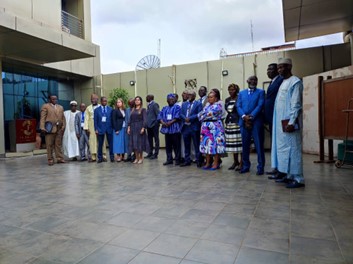
BUSS Workshop in CREFIAF region
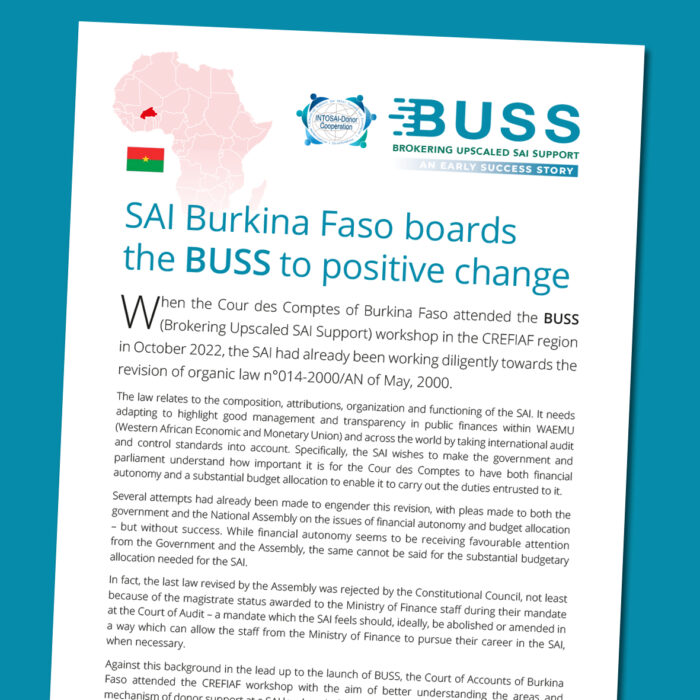
Launch of the Global SAI Accountability Initiative - GSAI
We very much appreciated the advice and guidance provided by the workshop facilitators on SAIs' relationships with donors, and especially the intervention of the donors that allowed us to understand in which areas they intervene and how they do it.
Mr. Poda, President of Burkina Faso Cour des Comptes
GCP Tier 2, meanwhile, which was delivered via the PAP-APP programme, has been re-invigorated as the Global SAI Accountability Initiative. IDC members have identified eight SAIs for targeted in-country capacity building assistance, through Peer support, resource persons, funding, support from regional and global development organisations and more. Simple processes and visual communications help SAIs to understand the difference between the various initiatives. For instance, any SAI can apply to jump aboard the BUSS, but only specific SAIs are selected for GSAI.
Goodwill Ambassador for SAI Independence
As for other IDC initiatives, the same path of ‘simplified yet amplified’ has also been consistently applied. Nowhere is this more evident than in the appointment of the IDC Goodwill Ambassador for SAI Independence on 1 January 2022. To everyone’s great delight, the Cooperation succeeded in appointing world leader, the Right Hon. Helen Clark, to the global ambassador position. Formerly New Zealand’s Prime Minister for three terms and Administrator to the UNDP for eight years, Helen Clark’s world stage stature and passion for upholding integrity in governance and PFM are second to none.
Her messaging and that of the IDC Leadership supporting her is consistently simple yet powerful. She and others like our IDC members aim to enable everyone, from citizens to parliamentarians and global development organisations, to understand and support the independence of their auditor generals’ offices. With simple, amplified information and resources and practical use of technology in the form of social media, the message expands.
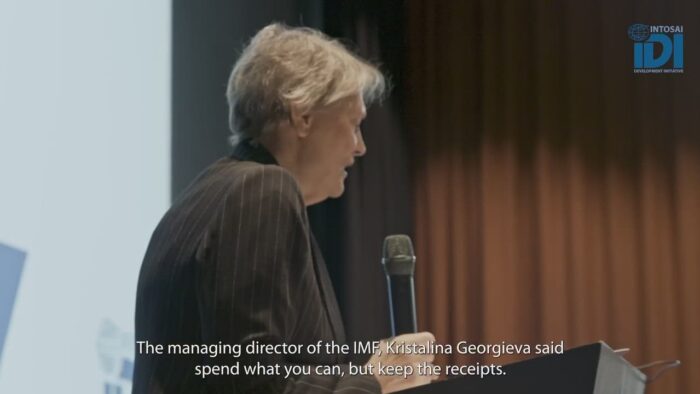
Moving forward
Finally, this simplified-amplified messaging is something which IDC shares with its members, donors, partners and Steering Committee. INTOSAI bodies are working ever more closely with development organisations in the integrity, anti-corruption, PFM and strong governance space, and representatives from the leadership such as GAO’s Gene Dodaro, the World Bank and more have been speaking about SAIs in global media and through influential channels. Increasingly, IDC is invited onto platforms and events with these partners, either live, online or hybrid, to amplify all messages in alternative ways in order to reach as broad an audience as possible.
As the fall-out from the pandemic continues to affect SAIs and the citizens they serve, the overall results of this subtle shift in perspective are yet to be seen in full. However, IDC is already able to identify significant areas where brokerage and funding, global advocacy, peer-to-peer support and the provision of fundamental resources are helping SAIs in challenging contexts in direct and impactful ways. Above all, the simple-yet-amplified approach that was highlighted by PFAC and FISP is now illuminating the key fundamentals of IDC’s work. It is, after all, the Cooperation.
